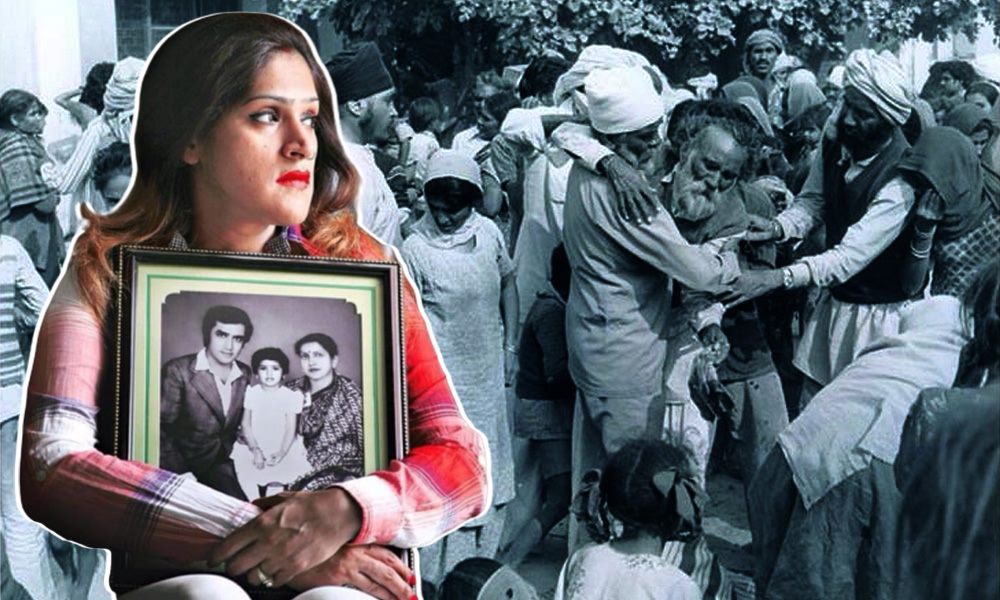
Image Credit: tehelka
"My Father Meant The World To Me": How A Woman Forgave Her Parents' Killer In The Aftermath Of 1984 Riots
Delhi, 3 Jun 2020 12:13 PM GMT | Updated 4 Jun 2020 2:03 PM GMT
Editor : Navya Singh |
Navya writes and speaks about matters that often do not come out or doesn’t see daylight. Defense and economy of the country is of special interest to her and a lot of her content revolves around that.
Creatives : Nandan M
Creative designer Skilled in Photography, Graphics, Typography, Animation, and Editing. Strong arts and design professional with a diploma focused on adobe suit.
To avenge the murder of thousands of Sikhs in the 1984 anti-Sikh riots, Ranjit Singh Gill shot dead Avantika's parents, Congress MP Lalit Maken and his wife, at the doorstep of their Delhi house.
Years after the 1984 anti-Sikh riots, the imagery of the bloodshed sends a chill down our spine. After Indira Gandhi was assassinated on October 31, 1984, by two of her Sikh bodyguards, mobs went on a fearful rampage against Sikhs in Delhi and other cities.
The incidents that followed haunt us to this day. Over three days, at least 2,733 Sikhs were killed, their property looted and destroyed in Delhi. Elsewhere in the country, hundreds of other Sikhs were mercilessly murdered.
At that time, Ranjit Singh Gill, also known as Kuki, was a young man, a bright student, a loving son and a caring brother. Kuki completed masters in Genetics and Crop Sciences, and being a gold medalist, dreamed of pursuing his PhD. However, the events of 1984 affected him so intensely, hurt him so deeply, that he decided to help the Sikhs get back on their feet.
Kuki visited refugee camps, saw thousands of devastated people, and felt tremendous anger and a thirst for vengeance in order to avenge the death of the people of his community.
In the aftermath of the mass killings, Kuki came across a book named 'Who Are The Guilty?', which is a fact-finding report by an independent citizens' group. The book had detailed descriptions of the events that followed Indira Gandhi's assassination. The book, which Kuki became hooked to, named some individuals as the main perpetrators of the crime.
Congress MP Lalit Maken was among them.
The Murder Of Lalit Maken
Knowing a little about Kuki is imperative here, if we have to understand how the woman, about whom this story is written, led her life.
Avantika Maken, Lalit Maken's daughter, was in class 1, about six years old, when her life was about to change forever.
On July 31, 1985, Avantika was in school. Lalit Maken was coming out of his house in Kirti Nagar when he was hit by a bullet. As Maken attempted to get back inside the house, more bullets were fired at him. His wife, who was a Congress Party worker, tried to shield him, and was hit too.
Maken, who was hit by at least 28 bullets, died on the spot. His wife lost her life in the hospital.
Kuki had taken his revenge. It was an eye for an eye.
Avantika's Journey
"My father meant the world to me. No man in this world can ever replace my father," Avantika tells The Logical Indian. "His death was an irreparable loss for me."
The anger that began to build inside the little girl troubled her day and night.
"I was just around six at that time, and when anybody asked me what I wanted to do when I grew up, I would tell them that I wanted to kill my parents' killer. That anger was evident to everyone," Avantika says.
Following the double murder, a nationwide manhunt was launched by police to nab Kuki. Kuki, however, managed to evade arrest and escape to the United States with his friend Sukhminder Singh Sandhu (Sukhi), who was also on the run from police.
After spending days in the US, Kuki decided to return to India. He was tired of hiding and ready to face the consequences of his actions.
On May 14, 1987, Kuki and Sukhi were arrested by the American authorities in New Jersey just as they were preparing to fly back to India.
On July 25, 1992, Avantika's maternal grandfather, Dr. Shankar Dayal Sharma, was sworn in as the ninth President of India.
"After spending years at a boarding school, I finally began living with my maternal grandparents. Rashtrapati Bhavan was like heaven. I had my own room there, I learnt to play the piano and to swim. My grandparents were very fond of me," Avantika says.
"However, growing up without parents was not easy. Harsh as it may sound, I was an orphan. I was a topic of discussion even as a teenager. People said I was rash. They did not want their children to play with me," she adds.
Despite having herself heard people talking ill about her, Avantika was too young and gentle to be able to face them and counter them.
"You may have loving grandparents, but no one can ever fill the void that the absence of your parents creates. No Rashtrapati Bhavan, no lavish lifestyle can fill the gap left by your parents. At every step in my life, I realised that even if the entire world turns its back on you, your parents never will. I could never wrap my head around the fact that someone killed my parents and ruined my entire childhood," says Avantika.
What Happened To Kuki?
Kuki was locked up in a jail on the ninth floor of the Metropolitan Correctional Center, a place which people said could make one either dumb, or numb. Kuki and Sukhi remained in the American jail for well over a decade - first in New York and then in Otisville.
Image Credit: Ranjit Singh 'Kuki' Gill/Facebook
Sikhs in the United States hired prominent human rights lawyers to defend the duo.
Finally, 14 years after his arrest, Kuki won a judicial victory in his extradition case. He was brought back to India and kept in Delhi's Tihar Jail.
In his 2003 verdict, 18 years after his arrest, Kuki was given life term by the court for the murder of Lalit Maken.
Avantika Meets Kuki
Meanwhile, Avantika grew up, got married and had a family.
"At that time, Sheila Dikshit was the Chief Minister of Delhi. I learnt that Kuki's sister, Dr. Devinder Kaur Saran, had approached her for leniency in his case," Avantika says. "I called up Sheila Dikshit's PA, and clearly said that if Kuki was shown any leniency, I would stage a protest outside her house."
"Leniency, in fact, was a far-fetched idea. I wanted him to be hanged," he adds.
Consequently, Kuki's case was deferred.
In January 2004, Kuki got an interim bail of 14 days as his mother was dying of cancer, while he was serving the fourth year of his life sentence. Kuki went to jail when he was 23, and stepped into his house again at 43.
Kuki lived in Ludhiana under strict surveillance, with regular visits to the police station.
"In May 2004, I was going to visit Ludhiana for a day, for some work," says Avantika. "That is when a journalist told me that Kuki wants to see me."
Avantika was then the general secretary of NSUI, the frontal student organization of the Congress party. Avantika's husband, Ashok Tanwar, was the President of NSUI.
"I am a person who often makes decisions in a rush. I immediately told the journalist that I was ready," says Avantika.
Avantika went to a restaurant to meet Kuki.
"I was sitting in the restaurant alone, with bodyguards around, when Kuki entered with his sister. I was taken aback, because Kuki was quite the opposite of what I had imagined him to be. He was a well-dressed, educated man - not the kind of person who could be imagined to be a 'murderer'," Avantika says.
Avantika says that as Kuki and Devinder came and sat down with her, there was some silence. Then Kuki said that they were sitting at this restaurant now, together, because of the events of 1984.
"I asked Kuki why he had killed my parents. He told me about the book that named my father, and I was taken aback," Avantika says. "I asked him why he killed my mother, and he said that he was sorry and he did not intend to. It happened as my mother attempted to protect my father."
What followed was an emotional exchange of dialogues. Avantika began talking about her childhood, and both Devinder and Avantika cried.
"Devinder told me that I was free to take out my grudge on him in any way I wished, but it's been two decades and he should not have to go back to prison. That conversation, that encounter, changed something in me," says Avantika.
Within three days, Avantika visited Kuki's residence, and had lunch with his parents.
"You know, I saw how Kuki's family was grieving. It was a replay of the events of my life. I saw his parents crying, and I remembered how my grandparents broke down when my parents died. Being a human being, I just could not let anybody go through what I went through," says Avantika.
The next day, Avantika met Sheila Dikshit and asked for Kuki to be released at the earliest. In 2009, Kuki was permanently released from jail.
"I have had a tough childhood, I grew up with a lot of rage within me. But time has made me realise that forgiveness is a personal choice that makes you live in peace. I have suffered and so has Kuki - in different ways. Kuki made a mistake, and for that he has been punished enough," Avantika says.
"The events of 1984 changed my life. When I met Kuki for the first time, I realised how grief and injustice can drive you to do things that you would otherwise never dream of doing. Kuki may have been a convict, but he was never a criminal," she adds.
Years later, in 2016, Kuki, his wife and his daughter visited Avantika's house in Sirsa. They dined together and talked about bygone days.
"All the anger that was in me has completely vanished. I hold no grudge against Kuki or anyone else. I live a happy life knowing that an act of kindness on my part helped a family get back on its feet," says Avantika.
Kuki now writes for a news portal based out of Punjab.
Also Read: "I Forgive Kasab": Woman Who Lost Her Family In 26/11 Terror Attacks
 All section
All section














